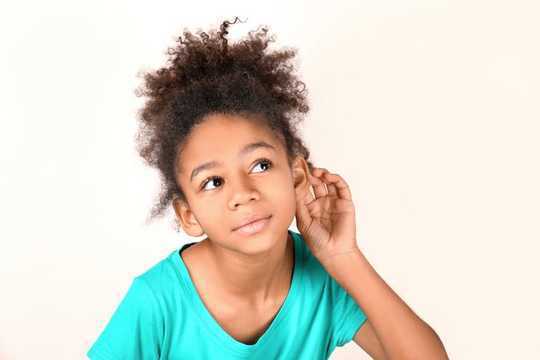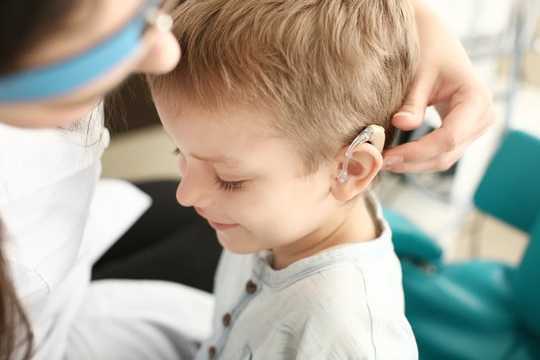
Africa Studio/ Shutterstock, Author provided.
When we are born, our brains have a lot to learn. For the newborn baby, everything they learn about the world around them comes from their senses. Therefore, if a child’s brain is deprived of sensory information, it will continue to develop, but in a different way.
A good example of this comes from children who are born deaf. Research has shown that adults who have been deaf since birth show changes in the way their brains process sensory information. Parts of the brain that would normally process sounds (the so-called auditory cortex) are also activated by visual stimuli, for example.
However, we also know that timing is everything. If someone becomes deaf as an adult, their brains won’t suddenly change, if at all. But if a child is born deaf, early intervention is key. Such children would need to be fitted with cochlear implants within the first few years of life if they wish to maximise their chances of being able to hear.
Until recently, scientists believed that these sensitive or critical periods only applied in cases of severe sensory deprivation – for instance, in deaf children with little or no access to sounds. However, our research found that even mild-to-moderate hearing loss in childhood was linked to changes in the way sounds are processed in the brain during adolescence.
In our study, we measured the brain responses of a group of children with mild-to-moderate sensorineural hearing loss while they were listening to sounds. Sensorineural hearing loss is a permanent hearing loss caused by damage to the inner ear, in this case the cochlea. Those with “mild” hearing loss have a loss between 20-40 decibels – which typically makes it difficult to follow speech in noisy situations. Those with “moderate” hearing loss have a loss between 41-70 decibels, which makes it difficult to follow conversational speech without hearing aids.
The sounds they listened to varied, from simple non-speech sounds (such as a beep), to complex non-speech sounds (which sounded like speech, but without any distinguishable words or information). They also listened to speech sounds (complex both acoustically and linguistically).
We used a technique called electro-encephalography, or EEG, to measure the tiny amounts of electrical activity that happen in the brain in response to sounds. Because we know that brain responses change during childhood, even in those with normal hearing, we divided the children into 8-12 year-olds and 12-16 year-olds. We tested 46 children with hearing loss and 44 children with normal hearing, with roughly equal numbers in the younger and older groups.
We found several differences between the brain responses of children with hearing loss and those without hearing loss. But the most important finding related to a brain response that signals when the brain has detected a change in sounds. Whereas younger children with mild-to-moderate hearing loss showed relatively normal brain responses to a change in sounds, older children with hearing loss did not. In fact, on average, the brains of older children with hearing loss did not make these responses at all.
We didn’t believe the results at first, and thought that our findings might reflect historical differences between the younger test group and the older test group. For example, advances in medical screening and hearing aid technology may have differed between children born at an earlier point in time and those born later, resulting in better outcomes for the younger children. But to test whether our results were “real”, we needed to see what happened when the younger children got older.

We initially thought the results might have been because of advances in hearing aid technology for the younger participants. Pixel-Shot/Shutterstock
We waited about six years before contacting the children with hearing loss who had been in the younger group (8-12 years old) during the initial study. These children were now between 13 and 17 years old, which was around the same age as the older group was in the first study. Of those we managed to contact, 13 agreed to come back to be retested. We used an identical test to that of six years earlier.
The results surprised us. Whereas, six years previously, the brains of these children had been able to detect a change in sounds, now these responses had either disappeared or grown smaller. It was as though their brains no longer “noticed” important differences between sounds – although these children could still discriminate differences, the responses indicating that the brain had detected a change had gone. The children’s level of hearing loss had remained the same as it was six years earlier. Therefore, our results suggested that changes were occurring in the brains of the children with hearing loss as they grew older.
Earlier detection and better treatment
Our findings raise a number of questions, both for science and for intervention. In our study, the sounds differed in loudness for children with hearing loss compared to those with no hearing loss. An important question to ask is whether we would find a similar pattern of results for normally hearing children, if we tested them using quieter sounds.
Assuming not, our findings may provide an explanation for the higher-than-expected incidence of language difficulties among children with hearing loss. An important next step will be to see if these brain changes are linked to language difficulties in these children, and if we can predict those at risk of future difficulties.
Since 2006, all babies born in the UK have been offered a newborn hearing screen within a few days of birth. However, mild hearing loss is not routinely screened for, so it isn’t detected in many of these children until later in childhood, if at all. Our research suggests that this may be too late. Also, while hearing aids do a good job at raising volume, they are currently unable to address many of the changes in sound quality that children with hearing loss experience. It may therefore be that improvements in technology, combined with earlier intervention, will be key to stemming the brain changes associated with hearing loss in children before they occur.![]()
About the Authors
Lorna Halliday, Principal Research Associate, University of Cambridge and Axelle Calcus, Research fellow, École normale supérieure (ENS)
This article is republished from The Conversation under a Creative Commons license. Read the original article.\

Related Books:
Here are 5 non-fiction books on parenting that are currently Best Sellers on Amazon.com:The Whole-Brain Child: 12 Revolutionary Strategies to Nurture Your Child's Developing Mind
by Daniel J. Siegel and Tina Payne Bryson
This book provides practical strategies for parents to help their children develop emotional intelligence, self-regulation, and resilience using insights from neuroscience.
Click for more info or to order
No-Drama Discipline: The Whole-Brain Way to Calm the Chaos and Nurture Your Child's Developing Mind
by Daniel J. Siegel and Tina Payne Bryson
The authors of The Whole-Brain Child offer guidance for parents to discipline their children in a way that promotes emotional regulation, problem-solving, and empathy.
Click for more info or to order
How to Talk So Kids Will Listen & Listen So Kids Will Talk
by Adele Faber and Elaine Mazlish
This classic book provides practical communication techniques for parents to connect with their children and foster cooperation and respect.
Click for more info or to order
The Montessori Toddler: A Parent's Guide to Raising a Curious and Responsible Human Being
by Simone Davies
This guide offers insights and strategies for parents to implement Montessori principles at home and foster their toddler's natural curiosity, independence, and love of learning.
Click for more info or to order
Peaceful Parent, Happy Kids: How to Stop Yelling and Start Connecting
by Dr. Laura Markham
This book offers practical guidance for parents to shift their mindset and communication style to foster connection, empathy, and cooperation with their children.






















